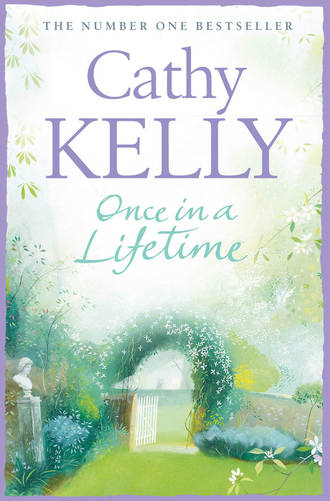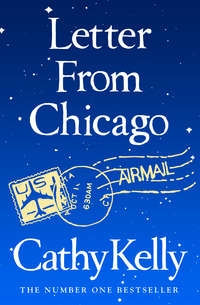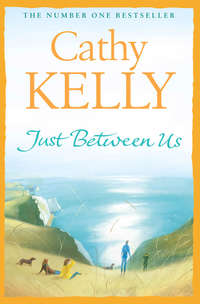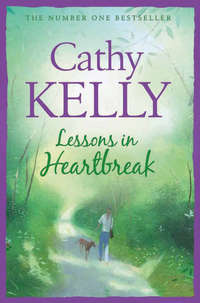
Полная версия
Once in a Lifetime
She had to reply to the latest batch of emails from people looking for a start in the TV industry. She loved helping people, but sometimes she got so many emails that it was impossible to deal with them all. She liked to answer those ones herself, they weren’t something she could hand over to her personal assistant, Gloria. Gloria was wonderfully efficient, handled Ingrid’s diary and organised all the reams of research she needed for her job, but Ingrid preferred writing a lot of her letters herself. No journalist could let someone else write for them. Hell, that was another thing, she’d been asked to be a patron of a journalism course.
Ingrid had never attended a journalism course. She had come into the business by a rather circuitous route: after her politics degree she got her start in radio, working behind the scenes as a researcher, and then producing, before moving into television news and from there, taking the totally unexpected giant leap into presenting. She approved of journalism courses and approved of helping people, but there really wasn’t enough time. Her schedule was always hectic, too hectic for all the causes she wanted to support. And even though the children were grown up, she still needed to make time for her family.
Tomorrow, Molly was coming for Sunday dinner. As she lay in bed with her eyes closed, Ingrid smiled. Her darling daughter was the reason the beautiful cream dress needed a trip to the cleaners. Molly had borrowed it for a formal event two months before.
‘Mom, I’m really sorry, I meant to get it dry cleaned, only I knew I’d forget about it and it’d get left there, so I thought I better drop it back to you first and…’ she’d said.
‘It’s fine,’ Ingrid interrupted. ‘Honestly.’
And she meant it. Kind, wonderful Molly was twenty-three and hopeless at things like dry cleaning and having milk in the fridge, but she was a one-woman powerhouse when it came to campaigns to help other human beings. Molly’s ethical work made Ingrid feel like a capitalist pig. Molly was involved in so many causes that it was a miracle she found time to do anything. By day, she was press officer for Fight Poverty, an organisation that worked with disadvantaged children. At night and at weekends, she rattled tins for an animal shelter, and donated her services to a charity that funded a small school in Kenya and hoped to fund two more. She cared about her carbon footprint, cycled everywhere and owned two rescue cats. She didn’t care much about ironing her clothes or eating food before its best-before date. Her mother was endlessly grateful that Molly lived with Natalie, her best friend and a person with organisational skills to rival Madonna’s, otherwise both Molly and the cats would be in their respective hospitals with food poisoning.
If only Ethan, twenty-one and currently on a year-long trip around the world with a group of friends, had one person in his entourage to match Natalie, then Ingrid would sleep so much better at night.
Ethan was usually quite good at emailing home, although most of the time his missives were frustratingly short.
Hi Ma and Pa, having a brilliant time, weather not great but the people are. Don’t worry, we’re all fine. Love Ethan.
Ingrid, who looked at everything in the paper and had the news on practically twenty-four hours a day, could hardly bear to look at any story about twenty-something world travellers any more. When she came across stories about Vietnam and Thailand, she was terrified that she might see something that would spell impending disaster for Ethan. He was travelling with five friends, all big, strong lads, and clever with it, but that didn’t stop her worrying. At twenty-one, they were innocents abroad; a bunch of friendly Irishmen who thought the best of people, and had a smile for anyone. All it would take was for them to turn up in the wrong place at the wrong time, and who knew what might happen. No matter how hard she had tried to teach her children a little of her own cynicism, it hadn’t worked. Ingrid could imagine Ethan smilingly helping some sweet girl get on the plane, holding her rucksack to be kind–and he’d be the one caught with whatever drugs she was trying to smuggle. Nobody would believe Ingrid if she told them that her son didn’t do drugs, that he was a good kid, that he’d clearly been duped. She’d be like every other mother who protested her son’s innocence. And they’d say: ‘Of course she believes him, but we know he’s guilty.’
She couldn’t bear it. She had to get up and stop thinking like this.
Even if David had been there, Ingrid wouldn’t have told him about the anxiety. David simply didn’t seem to understand it.
‘Ethan will be fine, you know,’ he’d say, when she let herself go with a stream-of-consciousness rant against what could happen to six hopelessly naïve young guys. No, even worse, what was it David had said the last time?
‘You have to let him go, Ingrid. He’s an adult, not a little boy.’
She felt the rip of rage inside her again, the combination of anger and helplessness at knowing that she couldn’t give her son a quick hug, just for five minutes. That’s all she wanted: to jump on a plane to see him, to touch him, for five minutes, then she’d get back on the plane happy, because she’d know he was OK.
‘I have let him go,’ she hissed at David. ‘But he’s my son, I love him and he’ll always be a part of me, so I’m frightened.’
Then the analytical Ingrid Fitzgerald had taken over, the woman who had interviewed thousands of spin doctors and psychologists over the years, who knew how to skewer an interviewee but who never normally brought her interviewing skills home. ‘Letting go is not what I’m talking about,’ she said coolly. ‘You can let somebody go and still worry about them. I need to be able to share that with you, because if I can’t…well, we shouldn’t be together, should we?’
David had sat up straight then. He’d been lolling on the couch with an after-dinner brandy, idling through one of the many newspapers they had delivered to the house every morning. The sharpness of her words had hit him hard. Something flickered in his eyes: fear, Ingrid thought and she was glad she’d hurt him, glad she’d given him a kick to remind him that he had to work at this relationship too. Then, she’d done something she almost never did: she walked out of the room, because she didn’t want to talk to him any more. She loved David, absolutely. After thirty years of marriage, she still loved him, but she adored her kids. Children were the third point in the eternal love triangle. It’s a pity David didn’t understand that.
He’d apologised and she’d forgiven him, almost. Ingrid didn’t believe in nursing grievances or in letting old arguments take root, but it had been very hard to accept David’s apology without screaming at him that he didn’t understand her at all.
Molly and Ethan might be grown up, but they would always be her children, and when it came to protecting them she would kill with her bare hands if it came to that.
She turned the shower off, wrapped herself in a towel and faced herself in the mirror. She looked tired today, every inch of her fifty-seven years. It took longer in the make-up chair at the studio now to make her look like Ingrid Fitzgerald, longer to make those shrewd grey eyes appear open and alert, especially with that drooping skin above her eyelids. She’d had her skin lasered to reduce fine lines but the next step was an eye lift, something she was putting off. She’d seen too many women who were preternaturally young, and while photographic retouching could make surgery look good in photographs of movie stars, in real life, women could appear strangely wrong, as though their faces were denying the wisdom of the lines they’d earned. Only the best surgeons were able to make people look like themselves but better. Ingrid knew such a surgeon, but she was still scared. Regular Botox was an occupational hazard. She was fundamentally opposed to the very notion of that, too. But she was also a realist who liked her job. Youth had such power. She was lucky–and yes, she knew there was some luck in there–that current affairs was a medium where age was less important than in other television arenas. If her job had been presenting a chat show, she’d have been fired when she turned forty-three. But in her field, age and gravitas were valued among men and women. Yet who knew when that might change? Ingrid accepted the fact that one day, her face would be judged too old for television. All it would take was some focus group led by a twenty-one-year-old hot-shot pronouncing that young viewers switched off in droves at the sight of a post-menopausal woman, and that would be it. Ingrid Fitzgerald’s television career would be summarily over, except for voice-overs on history compilations or an occasional documentary. She was far too shrewd not to know that one day this would happen.
Still, there was nobody here to see her or her wrinkles today. God knew when David would be back. Off with his mistress, she thought, with a hint of bitterness: the store.
Down below, the dogs began to howl. They weren’t allowed upstairs, but when they sensed someone was up and wasn’t rushing down to play with them, they began to whine pitifully.
‘Be down in a minute,’ roared Ingrid. It was nearly ten, so it had been a lie in after all.
When she was ready, she hurried down and sat on the bottom step as the dogs nuzzled into her with frantic delight. ‘Don’t pretend that David didn’t let you out earlier, you little scamp,’ she said affectionately as Lucinda, a golden cocker spaniel, started her desperate-for-a-pee dance. Then Sybil, a black-and-white bitza they’d got from Molly’s dog shelter, began to do the dance too.
Ingrid opened the kitchen’s double doors into the garden and both dogs barely made it out before they sank to their haunches in prolonged peeing sessions.
Ingrid stared, puzzled. They clearly hadn’t been out. The only explanation was that David, up at the crack of dawn, had left without going into the kitchen for breakfast and the dogs hadn’t heard him. Occasionally, if Ingrid woke early, she found the dogs snoring peacefully in their baskets and had the pleasure of seeing them wake and sleepily wag their tails. They were both old and their hearing wasn’t as good as it had once been, rendering them pretty hopeless as guard dogs.
What was David doing, racing off so early on a Saturday that he hadn’t even had time for a coffee or to let the dogs out?
A flutter of disquiet beat in her heart. True, he’d always been obsessed with the store, even more so in the past five years since the expansion.
‘When you borrow that much money, you need to spend more time at work,’ David told her in the months after the store re-opened following its twelve-million-euro revamp, and he was there morning, noon and night. ‘Nobody else can do it but me, Ingrid. I have to be there. You know that.’
Ingrid, who normally felt a certain relief that David was the main shareholder of Kenny’s because she knew of other family-run businesses where there were constant arguments over each mug bought out of petty cash, wished for the first time that he had brothers or sisters to help him.
Money wasn’t the issue. She got a good salary; without a penny of David’s money, they’d have been able to live comfortably. Ingrid had no desire for massive wealth. Lord only knew, most of the people with vast sums of money seemed to have doubled their problems with every year. For every rich person donating money to AIDS research, there were fifty more with kids who refused to work and wanted to do nothing more energetic every day than take cocaine and wrap their Lamborghinis round lamp posts.
Who needed huge wealth? They didn’t.
Surely they were at the point in their life when they could slow down a little, take more time out. She was doing less work these days, why couldn’t David be the same?
With the same disquiet, Ingrid let the dogs back in, fed them their breakfast and took out the coffee to make hers. She felt like phoning David and asking him what was so bloody important that he’d had to rush off at dawn. But that type of conversation never worked. Being a skilled interviewer had taught her that there was never going to be a civil answer to a question couched in such terms.
‘What do you mean, what was so bloody important…’ he’d respond, and they’d be off arguing.
No, far better to say nothing until later and remark kindly that he must be tired after getting up so early, and they could postpone their dinner out that night so he could go to bed early. And then, he’d explain why he’d been up early, and they’d be having a conversation instead of a hostile interrogation. If there was a problem, he’d tell her then. And Ingrid had the strangest feeling in her gut that there was a problem.
She had breakfast watching satellite news, the dogs at her feet hoping for scraps of wholemeal toast and honey.
‘I promise we’ll go for a walk soon,’ she told them.
She normally loved Saturdays when she had no specific place to be; the luxury of knowing that her time was completely her own thrilled her. But today, she felt unsettled and couldn’t put her finger on exactly why. Keeping herself busy, that was the trick. When she’d walked the dogs, she tidied the kitchen with her usual energy, then went into her small study to make a list of emails and letters she had to write. Nothing from Ethan. She did her best to calm the anxiety she felt at no word from him. She worked methodically for an hour, then powered down the computer, ran upstairs and collected everything that needed to be dry cleaned. Finding a jacket of David’s, she sat down for a moment, thinking about him. Between him and Ethan, all she did was worry. No, she must be positive. Ethan was probably having the time of his life. And as for David…Marcella–that was it, she’d ring her best friend, Marcella.
She went down to the hall phone, the one with the preprogrammed numbers on it, and brought up Marcella’s.
It was an unlikely friendship–Ingrid Fitzgerald, whose interviewing technique exposed the inadequacies of the great and the good, and Marcella Schmidt, image guru, whose job was keeping those inadequacies from the public view. Marcella ran her own spin-doctoring company and taught politicians and captains of industry how to talk to the media. If a formerly babbling, foot-in-mouth minister showed up talking sense and wearing a decent suit instead of a shiny one, odds on he’d been given the Schmidt Treatment. And if a big company boss found himself on an industry think tank that covered him with glory, and made people forget that he’d been caught coming out of a lap-dancing club three sheets to the wind with his arms round two lithe dancers, he’d been Schmidt-ed too. Marcella was brilliant at her job and she loved it. That’s why the two women had hit it off, Ingrid knew: shared passion. So what if Ingrid’s job was to find the cracks in the politicians Marcella had Teflon-coated, they worked in the same lions’ den.
Ingrid knew that if she was photographed in flagrante in a hotel room with some glamorous captain of industry, Marcella would be the one she’d turn to. Not that such a thing would ever happen, but still. If shit ever hit Ingrid’s fan, she’d speed-dial Marcella Schmidt.
‘Hi, Marcella, it’s Ingrid,’ she said now when her friend picked up the phone. ‘How’s the luscious Ken Devlin?’ It was their running joke. Latin-looking god Devlin was television’s hottest young talk show host and one of Marcella’s big successes.
‘Can’t get enough of me.’ Marcella sighed as if she was worn out from his amorous attentions.
‘Still?’
‘Still. Wants to have wild sex with me into the middle of next week.’
‘Only next week? What about the week after?’
‘He doesn’t have the stamina for the week after,’ Marcella said with a grin in her voice. ‘Young men–can’t keep up with older women. That would be an interesting opinion piece for the papers: When your sexual peak and his don’t match.’
‘Only if you want to be humiliated forever for being a forty-something woman writing about having sex with a younger man,’ said Ingrid. She saw that Marcella was kidding. ‘You know the rules: male silver fox and younger woman? Totally acceptable, and man gets slapped on the back by all his envious friends. Female silver fox and young man? Collective yeuch and everyone thinks either she’s paying him or he has an Oedipus complex.’
‘Pity,’ sighed Marcella. ‘I need an op ed idea for the Courier Mail.’
‘Personal never works,’ Ingrid said. ‘You should know: you tell people that often enough. Anyway when did you bonk a much younger man? How did that slip past my radar?’
‘Nothing slips past your radar,’ Marcella retorted. ‘Oh, it was years ago. Technically, it probably doesn’t count as I was only thirty-seven and he was thirty-one, and the age issue only counts when you hit forty. Before forty, you have a permit to screw anything you like. After forty, it needs an act of parliament. Besides, it was before I knew you. Just after I divorced Harry.’
The big difference in their lives was personal: Marcella had been married twice in her youth and divorced. The first was rarely mentioned, but she was still friends with her second. Harry was often around: funny, kind, handsome in a rumpled professor sort of way. Ingrid adored him and was curious as to why he and her best friend had divorced, but because it had all happened before she’d met Marcella, it had never been discussed on a forensic level. Marcella merely talked about how she and Harry were too similar for comfortable living conditions. Clever, opinionated men who were used to being in control were great as friends but very annoying as actual husbands.
When Ingrid saw the two of them together at a party, arguing happily over everything from politics to the merits of the latest movies, she wondered if it would have been different if they’d had children together. Kids rubbed off rough edges very quickly. But that had never happened. After Harry, a suitable settling-down man had never come along. Marcella had looked for him, that was for sure. She’d gone to parties, met men at friends’ dinner parties, taken scuba-diving holidays with a lone-travellers group, trekked Peru and made fabulous friends with two men–a gay couple who ran a successful restaurant in Donegal. But the man of her dreams eluded her. Without him, there were no babies with Marcella’s laughing dark eyes and sallow skin. At forty-nine, Marcella fitted so seamlessly into the role of aunt-by-proxy that nobody would ever guess she’d longed for her own children.
Occasionally, the subject came up. Like the time a journalist phoned Marcella with a blithe request for an interview on a piece called ‘childless by choice’.
‘Childless by choice?’ Marcella had hissed that night when she sat in Ingrid’s kitchen and sank a glass of Stellenbosch red, even though it was a weeknight. ‘Who is childless by choice? Very-bloody-few people, that’s who. And if they are, good luck to them. Let them talk to journalists about their decision and how they prefer not to add to the world’s population or how they know parenting’s not for them and decided to be grown up about it. Good luck to them.’ She was hoarse with anger. ‘But most of us aren’t childless by choice. We’re childless by mistake, childless by never finding the right bloody man, and if we do, he’s leaving being a father till he’s made his money and he’s not interested now, honey, and let’s just have fun! Have you thought about Capri for a holiday?’
‘She’s totally insensitive, that reporter,’ Ingrid said, trying to lessen the blow. ‘When we were doing the general election programme, she did an interview with me and asked me was it depressing at my age to work in an industry where women in their fifties were sidelined because their looks had disappeared.’
David, who was cooking at the stove, exploded with laughter.
‘What did you tell her?’ he asked his wife.
‘I gave her my very intense interviewing stare,’ Ingrid replied with a grin, ‘and said it was sad that women were still judged on their appearance, and that the glory of being older and wiser was not worrying so much about the outward face but rather about the person inside.’
Marcella looked up miserably from her glass of wine. ‘So you didn’t tell her we spend ages discussing plastic surgery and that we’d be having facelifts like a shot if only we weren’t so photographed that people would instantly know we’d gone under the knife?’
David laughed uproariously again.
Ingrid joined in, then sighed. ‘I get so sad thinking that I have to have a facelift,’ she said. ‘Botox is one thing.’ Her hand stroked her smooth forehead. ‘But a facelift is so radical and yes, I know I work in television, but it goes against all the things we believe in, Marcella: that women are brilliant and a few lines on your face shouldn’t make you any less brilliant.’
‘I don’t know what I believe in any more,’ Marcella sighed. ‘I used to believe there was someone out there for me and there isn’t. Just me, my job and people asking me how it feels to be a sour old spinster who’s childless by choice.’
‘Believe in that wine,’ David said, refilling her glass.
‘You’re such a lovely man,’ Marcella said. ‘Why don’t you have a brother for me, David? Why didn’t I ever find someone as nice as you?’
Ingrid and David exchanged a worried look. Marcella didn’t get down very often, but when she did, her emotional elevator went down to the basement at warp speed.
‘I’m not as lovely as you think, Marcella,’ David said kindly. ‘I’d drive you mad, wouldn’t I, Ingrid?’
‘Stone mad,’ Ingrid had agreed.
Ingrid wondered now what Marcella would say if she blurted out her concerns about David, that he’d rushed off to work at first light on a Saturday morning leaving her with the feeling that something was wrong, that David was keeping something from her.
Marcella was lightning quick. ‘Is there trouble with the store?’ she’d ask, which was exactly the question rippling through Ingrid’s mind. She decided not to mention her anxiety to her friend. If there was something wrong, David would tell her. It was disloyal to mention her fears before she had anything concrete to be worried about. Perhaps tonight they’d have a chance to talk.
‘What are you up to today?’ Marcella asked.
‘I was about to ask you that,’ Ingrid replied lightly. ‘I’m here on my lonesome as David has rushed off to Kenny’s to make sure it doesn’t all blow up in his absence.’
‘Men, huh?’ Marcella laughed. ‘Can’t live with them, can’t run them over with a truck.’
Ingrid relaxed. Her lightness had worked. Normally, Marcella was so attuned to people’s tone of voice that she could gauge any mental state from a five-second conversation.
‘Do you want to have lunch with me?’ Ingrid asked. ‘I keep hearing about this new brasserie in Dun Laoghaire near the pier. Want to try it?’
‘Beside the fish place? Tonio’s or Tomasio’s or something? Count me in. Meet you in Dun Laoghaire at one?’ Marcella said.
‘Perfect.’
She dropped off the dry cleaning and arrived at the restaurant at exactly the same time as Marcella. Lunch was hugely enjoyable. They generally tried not to talk too much shop. It would have been wrong to discuss which client Marcella was working with because chances were, sooner or later, he or she would end up on one of the navy-blue leather chairs on Ingrid’s set with Ingrid as high inquisitor. They talked politics, policy, and about people.
It wasn’t gossip, Marcella always pointed out. Gossip implied a nastiness about the discussions and there was never nastiness in their talks. They were interested in human nature, that was all. And they met all human life in their work. In the middle of all the policy talks, business meetings and sound bites, were people who worked hard, got passionate about their jobs, made mistakes, made deals, fell in and out of love.
Marcella and Ingrid were fascinated by the people behind the public façades: who had to make a speech in the Dáil chamber after being up all night with a colicky baby but would never mention it, and who’d use every nugget from their personal life for their own gain while not really caring about their family at all. It was no surprise that they both loved The West Wing, but wonderfully, they also both loved Neil Diamond, dancing and clothes.








